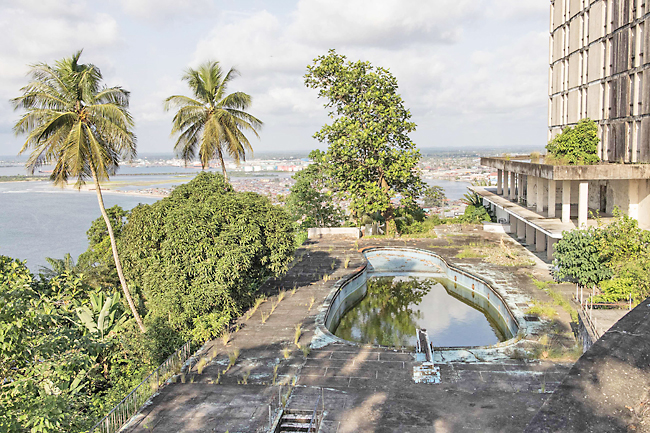MONROVIA (AFP) – Towering above Liberia’s ramshackle capital Monrovia stands a hotel that once symbolised an African dream yet today lies in ruins, a legacy of brutal conflict.
When it opened its doors in 1960, the Ducor was one of the only five-star hotels in Africa, boasting air-conditioned rooms, according to travel guides.
At its height, it hosted VIPs such as former Ethiopian emperor Haile Selassie. Guests would lounge by the swimming pool, sipping drinks and watching the sun set over the Atlantic.
But the Ducor shut in 1989 at the outbreak of back-to-back civil wars which ran from 1989-1997 and from 1999-2003, and swiftly fell into disrepair.
Today, little of Monrovia bears the visible marks of war, but the Ducor’s decaying hulk stands as a reminder of the conflict that killed over 250,000 people.
The hotel lies in limbo, and even who owns it seems unclear.
The ruin, atop one of the city’s highest hills, looms over Monrovia’s downtown and the densely populated West Point slum.

The former hotel’s rooms have been stripped bare, mildewy walls are pockmarked with bullet and shell holes, and the grounds have become a haunt for drug users.
“It makes everybody sad,” said retired Tourism Ministry official Ambrose Yebea who previously offered tours of the hotel.
Liberia’s government once planned to restore the hotel to its former glory with the help of former Libyan leader Moamer Gadhafi.
But there has been no progress since his downfall in 2011, and time continues to chip away at the Ducor.
There were few hotels in Monrovia in the 1950s, according to Yebea, prompting the construction of the Ducor in 1960 to cater to travelling executives and government officials.
Designed by Israeli architect Moshe Mayer, in modernist style, it became one of Africa’s most luxurious hotels.
Then Israeli-foreign minister Golda Meir, who later became prime minister, attended its opening ceremony. As did Guinea’s independence leader Sekou Toure. Photos of the hotel from the era show a gleaming building and guests taking life easy.
One of the persistent anecdotes related to the Ducor, which AFP was unable to verify, holds that former Ugandan dictator Idi Amin swam in the pool with his gun.
Another guest, Ivory Coast’s first president Felix Houphouet-Boigny, was so taken with the hotel that he arranged for Moshe Mayer to build a similar luxury establishment in Abidjan, which is still in operation.
Many of Africa’s leaders stayed at the Ducor during the 1960s and 70s, including Selassie, Yebea said, with several booking rooms during the 1979 conference of the Organisation of African Unity in Monrovia.
But by that point, the hotel was likely already in decline.
A 1975 World Bank report on Liberia describes the eight-storey hotel as “quite run-down” – and mentions government plans to renovate it.
Liberian ex-warlord Charles Taylor positioned gunmen in the Ducor during the 2003 siege of Monrovia, at the close of the war.
Later, squatters occupied the site. But President Ellen Johnson Sirleaf, who won office in Liberia’s first post-war election, evicted them in 2007.
She then launched renovation plans. In 2011, her government handed the Ducor to the Libyan African Investment Company (LAICO), a subsidiary of Libya’s sovereign wealth fund.
According to a 2011 government statement, the renovated hotel was due to have 151 rooms, restaurants, a shopping centre, and a tennis court – as well as provide jobs in the impoverished country.
However, the project – which with another scheme to develop a rubber-processing plant was priced at USD65 million – then fell foul of another war.
Liberia cut ties with Kadhafi’s Libya in 2011 as the country descended into civil war.
Renovation works stopped. “It came to us as a big shock,” said labourer Frank Williams who said he’d been one of 150 people employed by LAICO. “Today we are jobless”.
The project has been at a standstill since, and its future is unclear.
Neither Liberia’s presidency nor its Tourism Ministry, nor LAICO, responded to several requests for information.
The Libyan entity is under European Union sanctions over its alleged close links to the former Kadhafi regime.
In 2020, the UN Security Council also said that LAICO is struggling financially, incurring debts for the hotels under its management.
Some still hope to see the Ducor reborn.
Ambrose Yebea, the retired tourism official, said it could lure tourists and generate jobs.
“Every Liberian sees it the same way,” he said. “They want it to be refurbished”.







